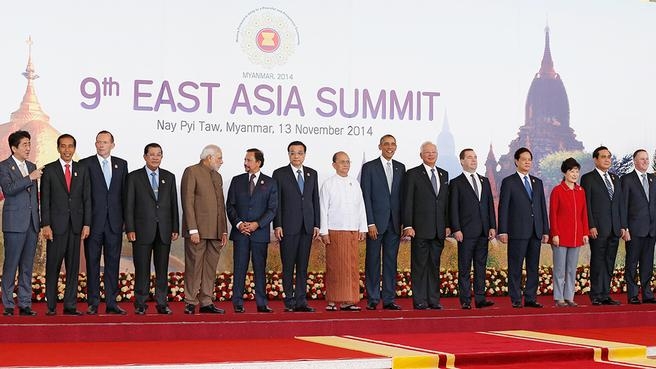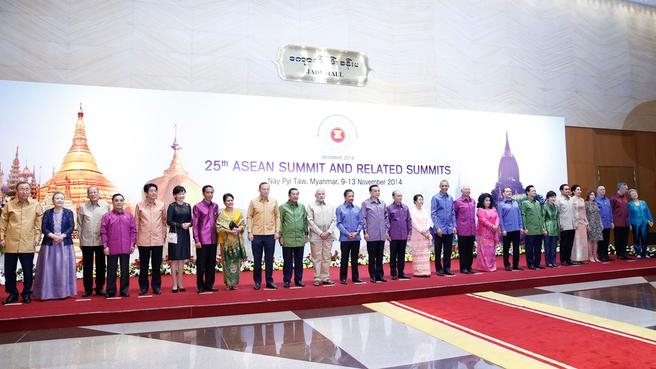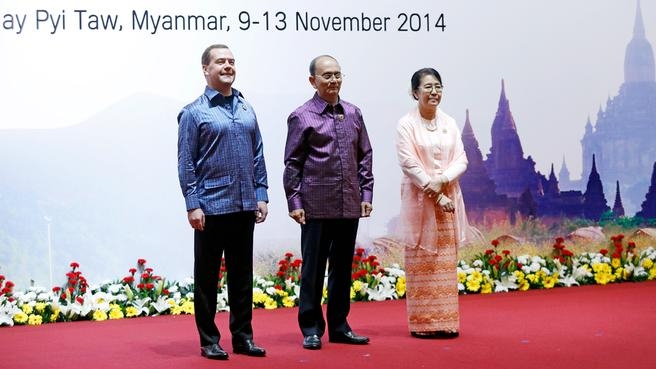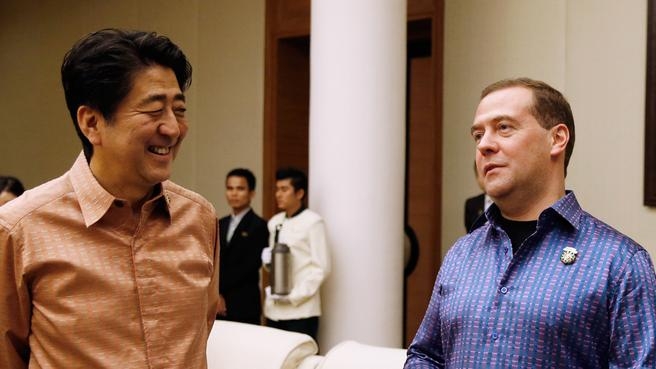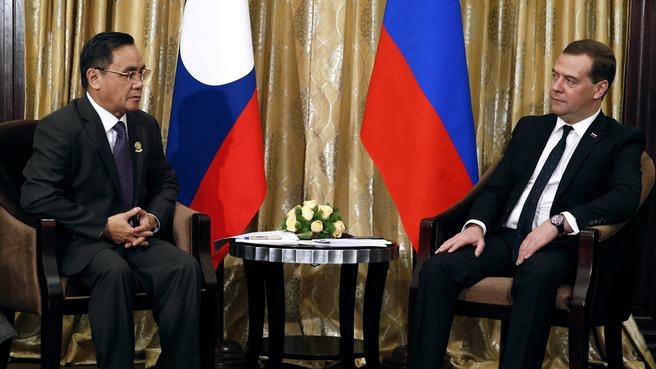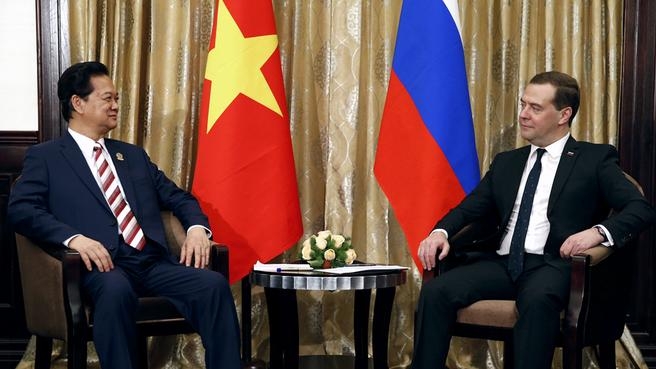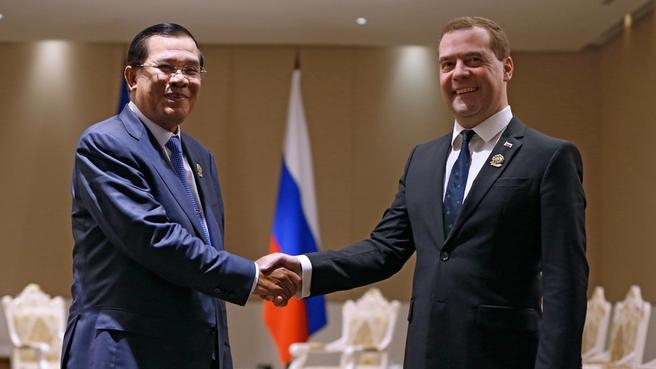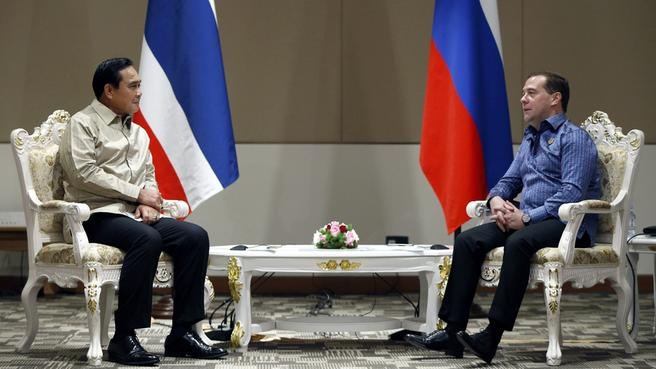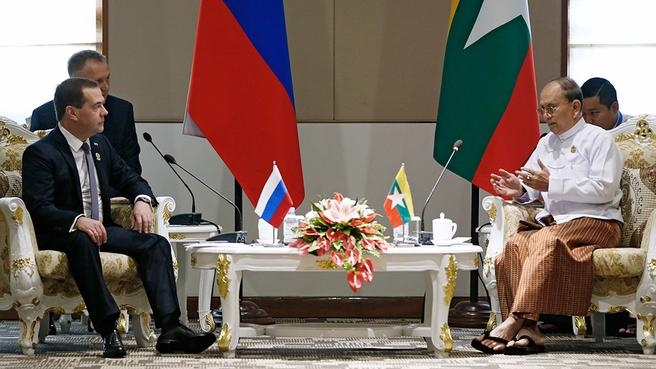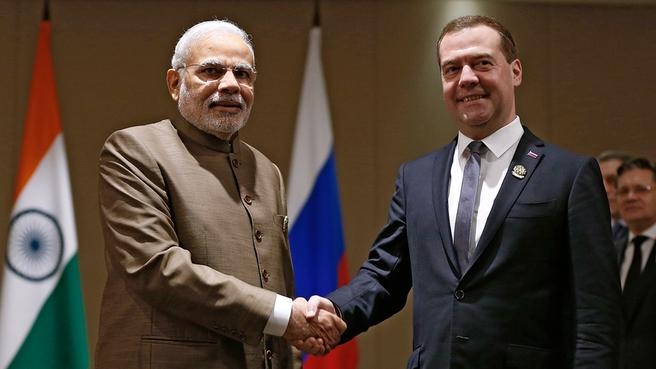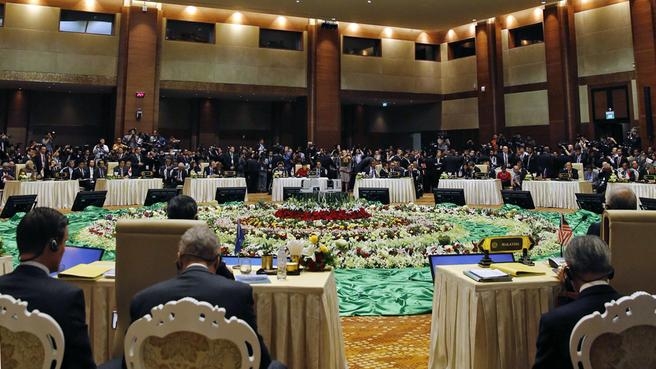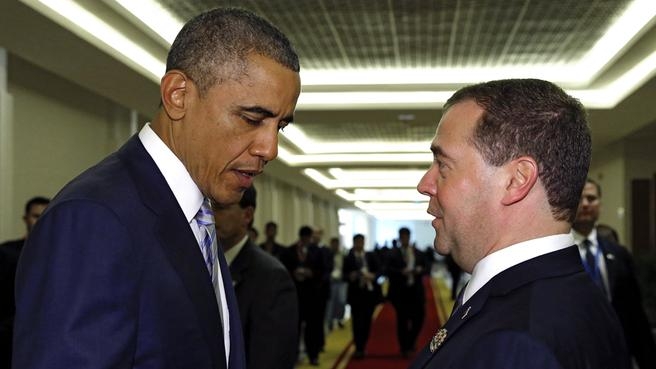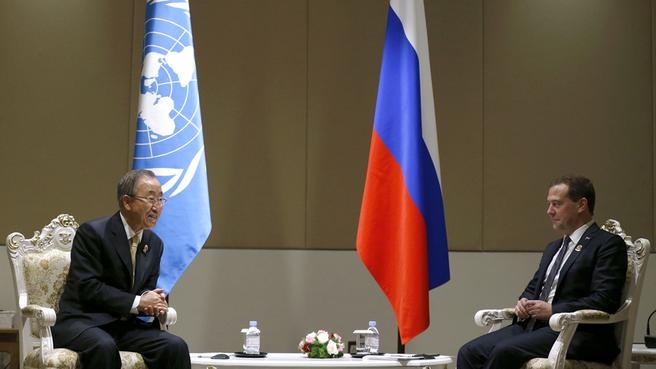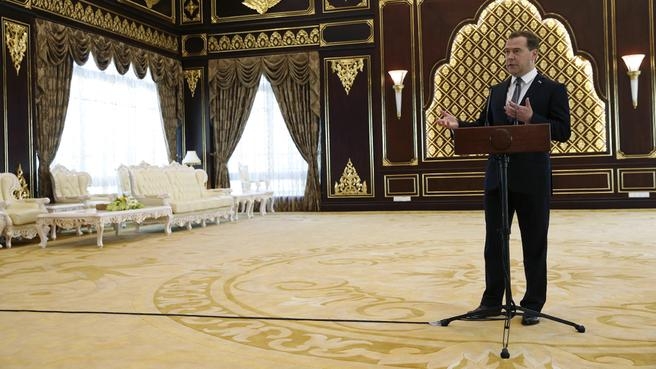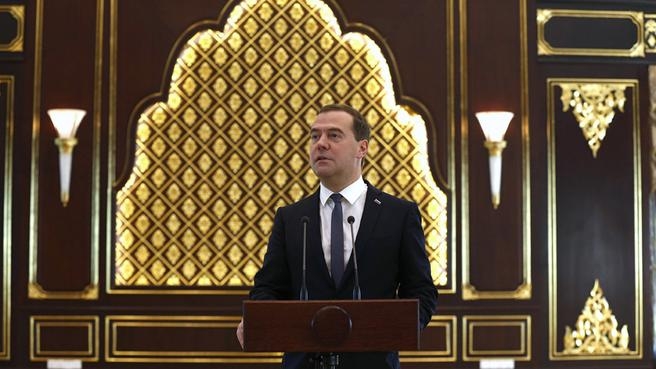Dmitry Medvedev has attended the East Asia Summit, met with the heads of delegations and gave a news conference.
Before the opening, Dmitry Medvedev had brief conversations with UN Secretary-General Ban Ki-moon, US President Barack Obama, Sultan of Brunei Hassanal Bolkiah and Prime Minister of Japan Shinzo Abe.
Prime Minister Medvedev also held bilateral meetings with the President of Myanmar, UN Secretary-General Ban Ki-moon and the prime ministers of the Socialist Republic of Vietnam, the Lao People's Democratic Republic, the Kingdom of Cambodia, the Kingdom of Thailand and the Republic of India.
Dmitry Medvedev answers Russian media questions following the summit
Transcript:
Dmitry Medvedev: This event is over. It was one of those summits where the participants were not divided on many issues, although there are some differences, of course. I’d like to start by saying that we did the right thing when we decided that Russia should become a partner of the ASEAN summit, and it is thanks to this decision that we can attend East Asia Summit meetings.
The member countries are huge manufacturers, for understandable reasons. Over half of humankind lives in Asia, and they create more than half of the global GDP, especially in the countries - participants of the East Asia Summit, where the world’s largest economies are represented. It is very important for us to keep abreast of things, to discuss the key issues that concern the East Asia Summit countries. This is only one of the formats we use, but it is a very productive format. We also take part in other formats such as the Shanghai Cooperation Organisation and the ASEM (Asia-Europe Meeting), but the East Asia Summit is no less important. Next year will mark ten years since the first summit. I hope we will celebrate this event and also our contribution to it through new solutions such as a concept for Asia-Pacific security. I made this proposal while speaking at a plenary meeting.
I’m willing to explain everything else by answering your questions.
Question: TASS, Veronika
Romanenkova. Apart from attending the summit meetings yesterday and today, you
have also held six bilateral meetings with your counterparts. Can you report
any breakthrough solutions that were coordinated during these meetings? Why are
our Asian partners interested in cooperation with Russia? What does Russia
expect from cooperation with the Asian countries?
Dmitry Medvedev: Asia is a vital economic partner, and not because of any problems in relations with Europe or the United States. No, we should have come to Asia long ago and developed full-scale cooperation with the Asian countries. Participation in the East Asia Summit is an opportunity to meet with our partners. Of course, these are brief meetings, and we aren’t signing many documents, but we are synchronising our watches and can use the event to promote projects that may be taking too long and to focus each other’s attention on other things.
I have had very useful meetings with all of our key partners, less China, because the Russian President has recently been to China and Premier of the State Council of China Li Keqiang visited Russia shortly before that. We held full-scale talks and signed over 40 documents. All of our other colleagues are here, and I have talked with all of them, including our key partner, India – I met with their new prime minister – and Vietnam, with which we have developed comprehensive cooperation and plan a state visit for next year, and the summit host, Myanmar, the ties with which are so far insufficient. The last Russian prime minister who visited this country was Nikita Khrushchev. On the other hand, he visited it twice, in 1955 and 1960. Many years later, we have come here at a high level, as they say, and we are interested in developing further cooperation with the Republic of the Union of Myanmar.
There is also Cambodia, relations with which go back a long way and with which we are discussing the development of a broad range of trade and economic relations. As for Laos, we have visited it relatively recently to attend events related to the summit. Thailand is another country that is very important to us. As I looked through the reference materials prepared for this meeting, I was surprised to learn that about 60 charter and regular flights are made to Thailand every week. This impressive number translates into1.7 million tourists a year. Apart from the travel business, there are also other aspects in our relations.
These are our main partners. We have discussed the key priorities with the leaders of each of these countries. I’m not going to focus on them now, because we only need to point to certain issues in relations with our partners to set things in motion, as do our partners.
In general, I am
satisfied with the talks we have had here. I believe that our partners have
benefited from them too, because it was very important to synchronise our watches
on the sidelines of the East Asia Summit.
Question: Mr Medvedev, you have had an opportunity to meet with Barack Obama. Unless it’s a secret, can you share with us what you discussed with him? What are your impressions of meeting with a man, whom you’ve known for a while, with whom you launched the reset of Russian-US relations, and who then imposed sanctions on Russia?
Dmitry Medvedev: You know, relationships have both personal and interstate dimensions. In terms of our personal relations, we naturally exchanged best wishes and sent greetings to our respective families, which is a normal thing to do when meeting someone you know. It is true that I have known him for quite a while. That said, it was impossible to have a full discussion at an event like this summit. It is my understanding that the US President recently had a brief discussion with Vladimir Putin during their visit to the People’s Republic of China. The G20 Summit will soon be held. Of course, we are discussing certain nuances, but overall this is not the right format for settling all of the outstanding issues. As I have already mentioned, what needs to be done to overcome these challenges is to abandon the sanctions, restore a working relationship and calmly resume normal and productive negotiations. Only then will the situation stabilise. When, exactly, this will happen is not something that depends on us since we were not the ones who introduced the sanctions. This was the initiative of our partners. As you know, sanctions cut both ways, so there’s nothing positive about them, as I have said on numerous occasions. They definitely create problems for both sides – the target country and those who impose them – but they don’t have any serious influence on international relations. This is especially true when sanctions are unilateral, when they are imposed by individual countries rather than by the international community based on the UN Charter. I am referring to unilateral sanctions or sanctions that are approved by several countries.
In this world, sanctions are lifted sooner or later, and relations return to stage one, whatever it was. It’s a pity, though, considering the huge amount of challenges… Today we discussed them, including the overall global financial instability, insufficient incentives for economic development and the terrorist threats such as the Islamic State, which somehow escaped attention before but has turned out to be deadly dangerous. And lastly, we discussed the Ebola virus disease. These are the issues we should focus on, but instead we have to waste our time on other things. This is very bad. I hope that this unfortunate period in international relations, in Russia’s relations with Europe and the United States, will end soon. I’d like to repeat, though, that the ball is in their court; it’s their side that needs to take necessary decisions.
Question: Dmitry Butrin, Kommersant newspaper. ASEAN is expected to launch its economic community in 2015, after which, as far as I understand, it will start creating free-trade zones around the world. Is a free-trade zone between ASEAN and the Customs Union possible?
Dmitry Medvedev: Of course it is. Moreover, only a short while ago, I said in my remarks that Russia closely follows the existing initiatives, including the global partnership initiative that was put forward by the People’s Republic of China, as well as the Trans-Pacific Partnership, which is to a large extent promoted by the US. This doesn’t mean that Russia is about to join them. We’ll see what comes out of it.
I also said that Russia is independently engaged in negotiations on establishing free-trade zones with our partners. We have made the biggest progress in this respect with the Socialist Republic of Vietnam, since almost all parametres have already been agreed upon. There are some nuances, but overall we have reached an understanding on almost all issues. Should this experience prove to be successful (with this deal, Vietnam would gain access to the common market of the Eurasian Economic Union), we will use it with other ASEAN countries (they are already asking us to do so). However, the first stage of this process has yet to be completed. If it is successful, may be more integrated formations will then emerge.
Question: Coming back to the sanctions, when, in your opinion, will they be phased out? Is it possible for Russia to abandon its sanctions, or should Europe make the first move?
Dmitry Medvedev: First, I have no idea of their intentions. They are the ones who decide. They were the ones who came up with it all, creating a headache for themselves and for us, and, of course, creating some challenges for us. So it’s up to them. In my opinion, the sooner it all ends, the better.
I’ve just talked about the benefits of the sanctions. There are actually zero benefits from sanctions.
As for retaliatory measures, I would like to remind you what they were all about. First, these were retaliatory measures, not sanctions. Second, in accordance with a presidential executive order, they will remain in force for one year but upon a Government initiative they could be cancelled even sooner. It goes without saying that they could also be extended. But these are retaliatory measures and they should be treated as retaliatory measures and nothing else.
These retaliatory measures will lead to certain consequences. Not all of them will be positive, since we are unable to instantaneously replace the whole segment that was lost following these government decisions. However, there is a positive side to it as well. Russians are beginning to get used to the fact that stores mostly sell Russian-made food products, and they are of high quality! As for the prospect of cancelling retaliatory measures, when it does happen – and there’s no doubt that it will happen at a certain point – not all imported food products will make it back to the store shelves, since they will have been replaced by Russian-made, high-quality and good-tasting products along with those made elsewhere, including in the Customs Union, the CIS and, last but not least, Asia-Pacific countries. By the way, heads of state and government I talked to have all been eager to promote food exports to Russia.
Question: Interfax news agency. Mr Medvedev, this question is a matter of great concern for many experts. For a long time, the stability of the rouble rate against the dollar and the euro has been included in the social pact of sorts between the Government and the people. But now as the rouble has lost much of its value, doesn’t it make you worry that government decisions may lose popular support?
Dmitry Medvedev: You know, if we’re talking about the social pact, the rate of the rouble has never been part of it. The rate is determined by supply and demand mechanisms, economic stability and macroeconomic processes, both domestic and external. It is true that people have grown used to a stable economic environment. In this respect, any depreciation is undesirable. That’s what the Central Bank has been saying. As Prime Minister, I had said that the depreciation of the rouble has been somewhat excessive, which means that it is undervalued. This resulted from objective economic developments, as well as speculation, which always takes place in such situations, including current oil prices. I think that a point of equilibrium will be reached overtime. That’s what market analysts are also saying. In my opinion, the rouble would gain in value, but, again, this is determined by the market and the Central Bank’s regulations (the Central Bank is in charge and assumes responsibility for these matters).
There is one point I want to make: preserving a stable environment for facilitating economic growth is a matter of great importance for the Government. These conditions are in place. First, we haven’t seen any fundamental, as they say, changes. Russia has big government reserves, which serve as a safety cushion. We intend to spend them only in case of desperate need, as the expression goes. Second, we are receiving a sufficient amount of foreign currency to meet our obligations. So all the talk about capital controls or additional foreign exchange restrictions ise groundless; these are either mere speculations or attempts to profiteer from the situation.
As for the current state of the Russian economy, despite all the challenges, the rate of the rouble and the economic landscape in general are not influenced by any fundamental factors. I hope that the situation will go back to normal in the medium term and will be acceptable to all economic players.
Question: Radio Vesti FM. The recent actions taken by the Russian Central Bank and the Government can be described as mobilisation measures. Does this mean that we are entering a long period of turbulence? Or are they the safety cushion you have mentioned? When could it be used?
Dmitry Medvedev: We are not taking any mobilisation measures, as I said in Sochi. Moreover, the decisions taken by the Central Bank have no relation to mobilisation, the mobilisation nature in the economy or any restrictive measures. On the contrary, refusal to maintain a currency corridor and refusal to continue to support the rouble on a large scale can be described as a liberal rather than a mobilisation measure. The point at issue is not what is going on in the currency market or regarding the exchange rate, but that it was a strategic goal that was formulated by the Central Bank and to which it drew our attention at a certain moment in time. A decision has been taken. We are not taking any extraordinary measures. I have said this before, and I can say it again: We are not restricting currency transactions, we have not approved the obligatory sale of currency revenues, and we are not introducing additional currency control measures in addition to the existing ones. What we are doing are not extraordinary regulatory measures.
Question: I’d like to ask a clarification question: You have mentioned Ebola and said that it was discussed at the summit. Have any joint agreements been made taken to fight the Ebola virus?
Dmitry Medvedev: You know that we discussed this issue. Absolutely everyone spoke about it, and I also addressed this issue in my speech. I have just talked about this with UN Secretary-General Ban Ki-moon, who specifically raised the issue.
I believe that it’s time we consolidated efforts towards this end. What does this mean? Each country chooses its own course of action. The situation is the most difficult in Africa, because this is where the virus, the infection originated. Nearly all countries are conducting research in this sphere. But it seems we should share our results in some cases to be able to create an effective antiviral therapy, whereas now all countries are working autonomously. On the one hand, this is not bad, because this can lead to the creation of several medicines with different levels of effectiveness and areas of application. But on the other hand, we are dealing with an extremely dangerous disease. Actually, this is what I said at the plenary meeting, on the sidelines, and during my meetings with Mr Ban Ki-moon and our other colleagues. This is what we should focus our attention on.
As for other decisions, we in Russia have made them. We have allocated tens of millions of dollars on this project, including research, preventive treatment and the purchase of equipment for diagnosing at least the initial Ebola symptoms such as fever, including thermal sensors and the like. There is still much to do at the national and international levels before we learn to effectively deal with this deadly disease.
Question: Alexandra Bayazitova, Izvestia newspaper. The finance minister recently said that the Government may need to review the budget if oil prices drop below $80 per barrel. This morning the media reported that this has happened. Will the budget be reviewed, and if so when? And lastly, what do you think about oil in general?
Dmitry Medvedev: I think only positively about oil, because oil is our sustenance. No matter what I may say – and you know that I’m all for modernisation and a knowledge-based economy, we should be realistic; we must admit that our country so far cannot develop without oil, without hydrocarbons, including gas. Besides, a hydrocarbon-based economy boosts innovation-driven growth, because it generates new projects.
As for prices, if oil prices take a plunge we may need to review the main parameters of our budget policy, but only if the price decline is really steep and long lasting. The current oil price fluctuations – $79, $81 or $85 – are not serious yet. But if the decline continues and becomes really serious, we’ll have to make some decisions. Every county has been through this, and we have done it too. This is what we did in 2008-2009, when oil prices dropped dramatically. We should act realistically.
Thank you. I wish you all a nice trip home. Good-bye.
